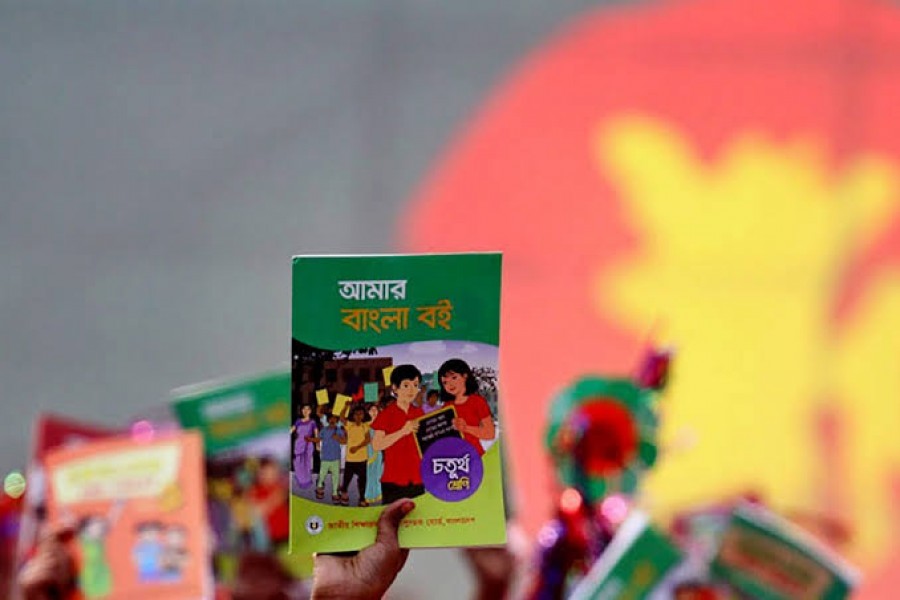Brisk preparations are on for reaching free textbooks to primary and secondary level students at educational institutions across the country. Books are ready for distribution. This year printing and binding of the books have been completed without any mess-up or irregularity.
Brand new textbooks are being sent to rural schools, especially those in remote areas in different upazilas. The sloppy quality and changes made to contents of some books whipped up criticism and controversies among the academics a couple of years ago. There have been no signs of such embarrassing rows till now this year.
In fact, society in general -- the students and their parents in particular -- has welcomed the massive government project beginning in January, 2010. Since that year school students have been receiving new books on January 1, marking the start of the academic year, amid a festive atmosphere. In years, it takes up to June for schools in inaccessible areas to receive the books.
The distribution of free school books every year in Bangladesh has been recognised as a laudable job. For a least developed country like Bangladesh, eying a middle-income status, the task is challenging. The country is expected to go ahead with the project also in the coming years, as it aims to see Bangladesh as a fully literate and educated nation. The long and arduous process begins at schools.
New books for everyone at the start of the academic years have reportedly been helping remove classroom-level discrimination among the students. Economically disadvantaged students these days no longer feel depressed with second-hand, worn-out books before them in classrooms. Freshly printed books emitting an incomparably sweet-freshening smell prompt a boy or a girl to concentrate on their studies.
The Bangladesh National Curriculum and Textbook Board (NCTB) is all set to distribute around 354 million textbooks for free among 42.5 million students at primary and secondary levels. They expect to distribute the books throughout the country as flawlessly as possible. Aimed at covering all educational institutions, the number of the publications continues to increase; so does the publication cost. According to media reports, publication of the free textbooks this year has cost around Tk 10 billion like in the years since 2010. The expenses are expected to reach Tk 10.5 billion in the coming year. The government's education authorities seek to make the project as inclusive as possible. As part of this objective, the NCTB has in the recent years brought students from the pre-primary stage and those from ethnic minority groups under the ambit of the countrywide government programme.
Notwithstanding insidious drawbacks, the programme of free distribution of school textbooks is one of the loftiest projects undertaken by the present programme. In spite of this, the demand for ending debates over some of the books' contents is feared to resurface this year, too. This irritant, if not addressed rationally and satisfactorily, may continue to haunt the grand programme related to preparing the future citizens.
A number academics and scholars feel the emotion-charged changes made to otherwise well-thought-out contents might detract from the programme's great objective. Lots of people are not against the changes. What they look forward to is a remodelled list of contents which are in conformity with the country's quintessential ethos. Child and teenage students' tender and impressionable mind may not be able to bear with the prolonged clashes of ideas vis-à-vis the lessons they learn from a book.
Free textbooks have not long been beset with some bleak aspects related normally to ordinary market commodities. A section of book traders would be seen selling the textbooks meant for free distribution. At places outside the capital they would be seen creating artificial crisis of these books. It is a dirty ploy to foist the books into the hands of desperate students and parents at exorbitant prices. Hoarding of textbooks by syndicates is, undoubtedly, unique to Bangladesh. Thanks to timely intervention of the authorities concerned, the blight could be dealt with in a short time. To everybody's relief, students and their parents do not have to buy their free textbooks from the underground markets any more.
The distribution of free textbooks among primary and secondary-level students has witnessed a lot of positive aspects in school education. As has been seen in the school feeding programme, the book distribution project has amazingly cut down on the dropout rates. Inability to buy or collect the required books by students on being promoted to higher classes once compelled many students to discontinue their studies. These boys and girls mostly belonged to the disadvantaged segments of society. The painful chapter plaguing the school students' careers at this early stage appears to have been coped with successfully.
Academics, however, put forward a few irritants which are said to carry the seeds of marring the book distribution programme. Despite the books' paper, printing and binding now being dubbed better-quality ones, their drawings and illustrations still draw criticism from the artist community. Many feel like comparing the free textbooks' artwork with those of the decades of the 1960s and the 1970s. Weak artworks in the textbooks once were among the drawbacks blamed for the countrywide criticism of publications. Those have reportedly been replaced with better drawings this time. Since the books are meant for school-going children and teenage boys and girls, their overall production quality ought to be aesthetically high. If the books are not attractive, no matter how interesting the contents are, students are feared to develop an aversion for these publications. Moreover, the changes in the free textbooks came also in the form of new chapters inserted to the books --- especially in English, math and Science-group publications. This has posed a new challenge to the education authorities. Dearth of teachers properly qualified to teach these subjects often overpowers the government's noble intention to add vibrancy to school education.


